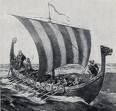ANGLO-SAXON POETRY
THE WANDERER, THE SEAFARER and the WIFE'S LAMENT

ANGLO-SAXON POETRY
THE WANDERER, THE SEAFARER and the WIFE'S LAMENT

Art imitates life so the mimetic theory stipulates. By examining the literature a culture produces, we may infer how they lived and what they valued. By examining these three short poems, we may infer that at least the following ideas / persons / beliefs meant a great deal to the Anglo-Saxons...
the archetype of the journey on land and sea
exile
alienation
love
the cyn
the mead hall
pagan values
Christian values
nature
the elegy
ubi sunt
fate
oral traditions
time
bliss / pain
the power of narration
marital bonds
fear
security
the afterlife
Although the Anglo-Saxon might indeed be hard pressed to articulate philosophy, Nussbaum is correct when noting in Cultivating Humanity that, "Philosophical questioning arises wherever people are." (p.17). Thus we may ourselves ask what questions they asked about the list that the poetry reflects
Notice that these do not appear in a particular order. What do you believe the Anglo-Saxons valued as their highest priority. Why? As we study the poems in relation to the research you have completed, what conclusions can you reach and why?
From the Greeks, we may turn to Heraclitus (540-475 BCE) for clues. Check these sites:
Primary source: Click here for the Fragments of Heraclitus
Click here for a site on the presocratic philosophers
ADDITIONAL RESOURCES:
(PRINT)
Abrams, M. A. (ed.). The Norton Anthology of English Literature, Volume I. Seventh edition. New York: W.W. Norton and Co., 2001
Alexander, Michael. The Earliest English Poems. Baltimore: Penguin Classics, 1969.
Bloom, Harold (ed.). Modern Critical Interpretations: Beowulf. New York: Chelsy House, 1987. (Contains Tolkien's: Beowulf: The Monsters and the Critics).
Frye, Northrop. Anatomy of Criticism. Princeton: Princeton University Press, 1990.
Gaarder, Jostein. Sophie's World. New York: Berkley Books, 1991.
Gardner, John. Grendel. New York: Vintage Books, 1989.
Greenfield, Stanley. A Critical History of Old English Literature. New York: New York University Press, 1977.
Nussbaum, Martha. Cultivating Humanity. Cambridge: Harvard University Press, 1997.
Wentersdorf, Karl. "The Situation of the Narrator in the Old English WIfe's Lament," Speculum Vol. 56. (July, 1981), pp. 492 ff.
Zesmer. David. Guide to English Literature: From Beowulf Through Chaucer and Medieval Drama. New York; Barnes and Noble, 1965.
RESOURCES:
(ON LINE)
You are aware of STUDENT CURRICULUM LINKS for the Anglo-Saxon Period. Note the following therein:
Bede's History of the English People
The Exeter Book
The Anglo-Saxon Chronicle